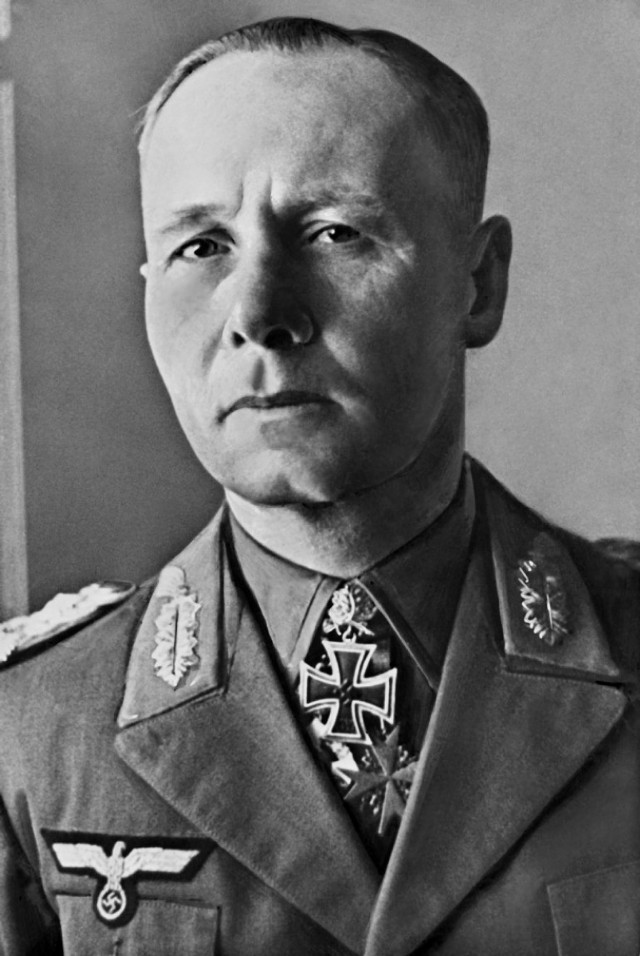Herr Generalfeldmarschall Rommel Takes Cyanide Poem by Lucius Furius
Herr Generalfeldmarschall Rommel Takes Cyanide
How distant my Swabian* youth seems now.
I made a glider which really flew, you know.*
Not far, but yes, it carried me! I soared!
Some accused me of being a showboat,
of tooting my own horn.... I learned early
that the laurels don't go to the meek or the bashful.
Yes, I was a Nazi. Those aristocrats
on the General Staff* belittled the Fuhrer-
but where had they gotten us?
I liked his enthusiasm and optimism.
We were in a hole; he led us out,
got the economy going again,
restored the Sudetenland and Danzig.
(Danzig where Lucie and I had been married!)
I thought Poland would be the end
but when we attacked in the West
I didn't shrink away.
My troops and I were the very spearhead:
strike quickly; do the unexpected.
Who was I to deny
Germany's world-wide destiny?
The African war agreed with me.
The open space gave a latitude to my strategy
lacking in hilly, forested Europe.
The victory at Tobruk is often cited
as the height of genius, military.
I, myself, prefer what preceded it:
the retreat into Tripolitania-
salvaging men and tanks, shortening supply lines,
lulling the British into complacency;
turning and stinging at Agedabia.
El Alamein: the Fuhrer and I part company.
'Victory or Death', he cabled me.
I disagreed: my men would not die senselessly.
We were desperate for gasoline.
Ship after ship was sunk trying to deliver it.
(Lax Italian security, no doubt.*)
We were outnumbered five to one.
I favored withdrawing immediately,
consolidating troops in Europe.
The Fuhrer wouldn't hear of it.
I flew to East Prussia to confront him.
He'd grown pudgier, more strident-
wouldn't give an inch.
I sensed that not just Africa
but the war as a whole would be lost.
The weight of the forces against us was crushing.
The only question'd been their willingness to fight.
That had been answered at Stalingrad.
I fought on in Italy and in France,
hoping to convince the enemy
that the price of taking Europe-
especially Germany-
would be too high.
I really thought we had a chance
to stop them on the beaches.*
But now that we've failed, our destruction's inevitable.
I've tried to make the Fuhrer see reason:
surrender to the British and Americans;
don't let our country be overrun by Russia.
He condoned murder-
ordered me to kill the French Jewish soldiers
who'd surrendered at Bir Hacheim, * for instance,
(I didn't) - and much more.... And yet,
and yet, I couldn't quite bring myself to wish him dead-
and certainly never took part in that plot-
though, yes, I knew of it... after a fashion....
Defending myself to that group would be hopeless*....
Lucie and Manfred* must be spared
the humiliation of hearing me declared a traitor.
I bestrode the plains of Africa-
Rommel, the invincible-
always with the troops where the battle was most critical.
I was crafty and brave,
dared to act when others shied away.
I was the apple of the Fuhrer's eye;
idol of the German people;
scourge of the British military.
All the world applauded me. I lost-
but only when outnumbered overwhelmingly.
Now I sit in the back of this Opel*-
an outcast, a criminal-
waiting to take a cyanide pill.
We failed to assess properly
the will of other nations to honor treaties
and preserve their freedom.
And, more basically:
Were we right to force our rule on other people?
Icarus-like, we flew too high.
We were bold and strong
but it seems, in the end,
in the end, not supermen.

Swabia: A region of southwestern Germany (around Stuttgart) which had been a dukedom in the 10th to 13th centuries.
glider: In 1906 Rommel, age 14, and a friend built a full-size, box-type glider.
General Staff: High-level officers with formal military education. Rommel, having come up through the ranks, lacked such training.
no doubt: Rommel was correct in thinking that the British knew the exact destinations and sailing times of Italian supply ships, but was wrong as to the source of their information: it was coming from German ('Enigma') radio transmissions which the British had learned to decode.
beaches: Rommel was in charge of the defense of the coast against British/American invasion.
Bir Hacheim: A fort at the southern end of the 'Gazala Line' (in Libya) which Rommel outflanked in his attack upon Tobruk in 1942.
hopeless: The army's Court of Honor (Field Marshal Keitel, Generals Guderian and Kirchheim) had been presented with evidence of Rommel's involvement in the plot on Hitler's life (false) and his attempts to arrange an armistice with the British (true) . With Hitler's approval they had given Rommel a choice of committing suicide (and having his treason hushed up) or of going before the court (and, no doubt, being hung in public) .
Manfred: Rommel's son.
Opel: The car which the officers who presented Rommel with his choices had driven from Berlin.
Note: This poem is one of the Humanist Art Homepage, Scraps of Faith poems.
This poem has not been translated into any other language yet.
I would like to translate this poem